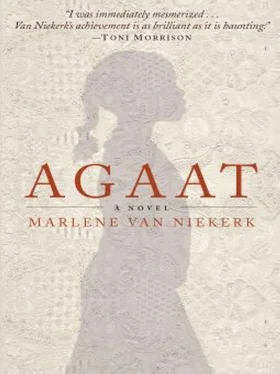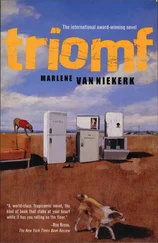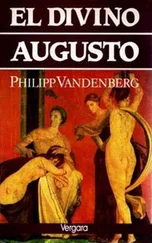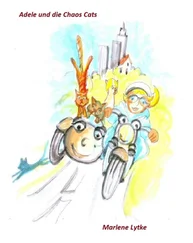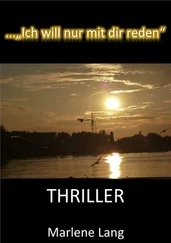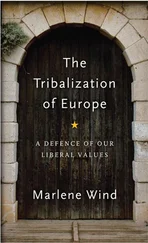They searched the house.
They found nothing.
When they’d finished, Agaat brought in tea. Not that you wanted to serve these people tea. It was she who wanted to see their faces. You knew she was standing in the kitchen eavesdropping on everything.
Whether you could provide the names of Jakkie’s confidants, they asked again and again.
You treated Agaat as if she’d been hired the day before. She behaved like a servant who came in once a week.
It’s in the national interest, said the officer, that you should immediately report every attempt on Jakkie’s part to make contact to the nearest police station, and that your failure to do so will make you accomplices.
To what? asked Jak.
It’s not possible to say at this stage, the chap replied, it could hinder the investigation.
The letter arrived a month later. Dawid had gone to collect the post in town and went to give the letter to Agaat in the backyard. You went to wait in the sitting room. It took half an hour. Then Agaat was standing in the doorway of the sitting room holding out the letter to you and saying: Read.
You read the first sentence.
Dear Gaat, by the time you get this letter I’ll have left the country, I asked somebody to post it for me in town once I’d gone, I hope it doesn’t get intercepted.
The handwriting looked different from Jakkie’s usual hand. Letters leaning forward and back at random, it must have been scribbled down in great haste.
Then Jak came in and grabbed it from your hands.
The two of you watched him reading it, his eyes racing over the lines. Jak turned white and then red and then he stuffed the letter into his pants pocket and stormed out.
You listened to him driving the car out of the carriage, hard in reverse, you saw him stopping in the mud-puddle at the gate, flinging open the gate and charging over the cattle grid so that the iron bars leapt up behind the wheels, the dogs barking in pursuit.
Agaat sat down. It was the first time, since her childhood, that she’d sat down like that with you in an easy chair in the sitting room.
But she didn’t sit back, she sat on the edge of the chair.
What does he write? I asked.
She didn’t answer you. Her hands went to her cap but she dropped them before she’d touched it. She looked as if she was listening, as if she wanted nothing near her ears in order to hear better, it looked as if she was counting.
Please, you said, how long must I still be kept in the dark?
You must have sat there for half an hour. There was a bright silence in the yard, birdsong in the September garden, the colours of crowfoot and anemones rioting in the mirror above the half-moon table, a trace of fennel.
Then you heard the crash.
Agaat remained sitting, her hands in her lap, looking straight ahead. Then she got up as if summoned to an everyday task. You remember the image, Agaat at the front door, etched against the bright frame of the spring day as she turned round to face you.
It’s down by the drift, she said, call Dawid, bring the bakkie, hurry.
You looked after her trotting down the road, one hand to the cap.
You went and struck the gong.
They were all there when you arrived on the scene. Dawid and Agaat and a whole lot of children and women from the labourers’ cottages. The Alfa’s back section was sticking up out of the water. One back wheel was still spinning. The top was down.
Jak was hanging over the water a bit further along.
A broken wattle branch had penetrated his chest in front and emerged from his back.
Agaat didn’t look at you.
Take him down there, she ordered Dawid and Julies, but in the end they had to saw off the branch. With branch and all they carried him out onto the bank. His face wore an expression of surprise. His jaw was dislocated. Agaat closed his eyes. Both of you put a foot on his chest on either side and pull with four hands, Agaat said.
One two three, she counted.
The branch came out with a glugging sound.
Sit down, Agaat said, and supported you under the elbow. You couldn’t stay upright.
So there you were lying in the green grass. You and Jak. And Jak’s branch.
The blood seeped away in the muddy water of the drift. The colour of the blood clashed violently with the red of the Alfa.
Agaat sent the women and the children home. Dawid and the other labourers had to go and fetch the tractor and a tow-rope and the stretcher. Saar and Lietja had to phone the doctor and fetch smelling salts from the medicine chest.
When everybody had gone, she bent and pulled the letter out of Jak’s trouser pocket, still as crumpled as when he’d stuffed it in there. It was covered in blood. The writing was smudged.
He wanted to go and hand it in to the police, Agaat said. And then he couldn’t get it past his conscience. And then he charged back, and then he couldn’t make the bend.
She separated the sheets of paper and smoothed them, carefully, and put them away in her apron pocket.
Let’s just revive you, then I’ll read it to you, then I’ll burn it, then we won’t know anything more about it.
Then she bent down and with a quick tug-and-push movement she reset Jak’s jaw.
Useful, you thought, she learnt to do it early with sheep emerging skew-jawed from the dipping-trough.
She came and held the bottle of smelling salts under your nose.
Just see how he skidded, Agaat pointed out.
You looked, the muddy track with the kink, the missing kerbstone from the shallow bridge.
When they put Jak down in the backyard, you heard it for the first time, under the keening from the kitchen, the formulation which they would snigger over unto the third and the fourth generation of labourers on the farm.
The baas of Grootmoedersdrift!
Aheu!
And so he saw his arse!
In the drift of Grootmoedersdrift!

they have not heard from me for so long they may well think I am dead it leaves me cold really I cannot deny I have let the world slip by my hand sometimes I still have the urge to call to scream to get up the need walks in waves but congeals an ocean of glassy gel noiseless salty white coast a dream but I am not sleeping am not dead am awake between me and me all hollows are silted shut a mountain without caves storeys without stairwell trapped in a lift the lift is myself no space to lift an arm sound the alarm the alarm is myself no space between me and me I fill myself fully my filling tissue-tension in a stalk would I burst? a pomegranate fall from a tree? messy but disposable? who will sweep up the pips in a scoop, who will scrape the sole of a shoe over the stain on the stone? or shall I leak from myself wind from an inner tube? carried out over an arm to the place of all inner tubes? images no longer offer solace my filling seed soil wind I am who I am impermeable no turn up or down or round possible the sight of a dead wall could relieve me but I am myself the wall am name am flour am history have occurred my damage is dense is black my tongue silts my mouth full of water oh my soul in me there is no room for you to mortify yourself

27 May 1955
Jak says we must make A. move in with Dawid and them and accustom her to her own people. The sooner the better he says, the child will grow up messed-up, she has no playmates. As if he cared one scrap about that. But he is right when he says the white children who come here don’t know any better, they think she’s farm stock & then they snub her.
I protest! She’s an exceptional somebody & she’s developed from the grimmest misery out of just about nothing. Every day I have reason to believe that all my trouble and dedication were not in vain & that the faith I had in the matter and every drop of sweat and tears that I put into her has now started bearing fruit. Everything has a purpose, I say to Jak, she’s been given to me to learn something about myself. To learn what it is that really matters in this life. Jak says I sound like a Jehovah’s Witness on Eau de Cologne. He says he thought I’d achieved total illumination some time ago and it’s not a matter of A. because all I can talk about is myself & and I can really spare him my sickly sentimental stories they give him a pain because all he sees in front of him is the worst case of megalomania & control freakery south of the Sahara.
Читать дальше
